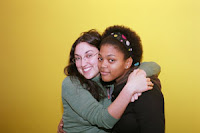 Personal hero Gloria Feldt–who is also on the Board of the Women’s Media Center, where I’m part of that first class of Progressive Women’s Voices–is about to hit #11 on the New York Times Bestseller list with her new book with Kathleen Turner, called Send Yourself Roses.
Personal hero Gloria Feldt–who is also on the Board of the Women’s Media Center, where I’m part of that first class of Progressive Women’s Voices–is about to hit #11 on the New York Times Bestseller list with her new book with Kathleen Turner, called Send Yourself Roses.
I met Kathleen at their book party earlier this week and was appropriately star struck.
But what I want to share via Gloria this morning is something she shared with us at PVW a few weeks ago. She was asked about the lessons she learned leading a social movement where she worked a great deal with the media and messages as vehicles of social change. And she told us about the importance of embracing controversy–something I’m still learning. I seem to keep playing it safe when reporters contact me to talk about intergenerational divide among women around the election. I’m working on how to respond without fueling a notion of “catfight.” Still working on it. Meanwhile, Gloria’s general comments to us are now posted on her blog, here.
In a nutshell, the 6 C’s of Embracing Controversy:
Controversy is the Courage to risk putting your Convictions out there to the world, using the controversy strategically, because controversy is a Clarifier—it gets people’s attention so you can use your platform to present your Case at a time when people are paying attention, and therefore controversy is a Change agent—because to make change you have to make people think differently, learn new things, and clarify their values.
May we all learn to follow Gloria’s example, I say. The woman knows from whence she speaks.









